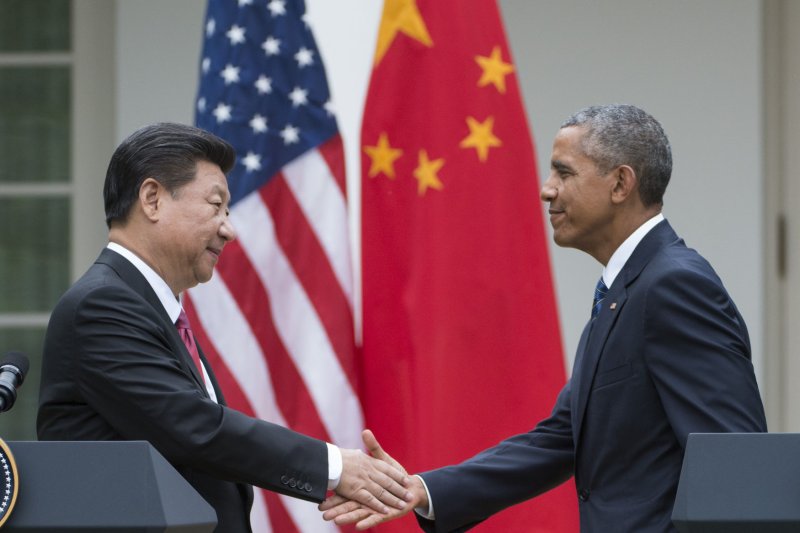U.S. President Barack Obama and Chinese President Xi Jinping shake hands Sept. 25 after a joint press conference in the Rose Garden of the White House in Washington, D.C. On Monday, in a statement on the Trans-Pacific Partnership agreement, President Obama said other countries should stand up to China’s trade practices. Photo by Pat Benic/UPI |
License Photo
BEIJING, Oct. 6 (UPI) -- China's exclusion from the finalized Trans-Pacific Partnership has provoked a range of responses from the world's second-largest economy, and an analyst said the deal is driven by political motivations to encircle China.
After the United States, Japan and 10 other Pacific Rim countries signed the TPP agreement on Monday, state-controlled Global Times ran a story with the headline, "U.S., Japan and 10 Other Nations Create Massive Economic Bloc to Rival China," Voice of America reported.
In the same newspaper, Ruan Zongze, vice president of the China Institute of International Studies, said the United States is keeping China out of the TPP for political reasons.
Washington, Ruan said, is trying to weaken the power of the World Trade Organization by promoting TPP and the TTIP, or the Transatlantic Trade and Investment Partnership, South Korean news agency Yonhap reported. Both agreements also are designed to keep out the BRIC nations, or the large economies of Brazil, Russia, India and China, according to Ruan.
On Monday, in a statement on the agreement, President Obama said other countries should stand up to China's trade practices.
"When more than 95 percent of our potential customers live outside our borders, we can't let countries like China write the rules of the global economy," Obama said. "We should write those rules, opening new markets to American products while setting high standards for protecting workers and preserving our environment."
The U.S. strategy to consolidate economic partnerships in the Pacific, however, cannot be closed forever to China, according to one Chinese analyst.
Yang Xiyu told Chinese state news agency Xinhua the TPP's exclusion of China is only temporary.
"In the long run, if the body aims to continue its development, it will surely open its door to China," Yang said.
Unidentified critics of China's political system on Chinese social media said only Beijing is to blame for its isolation.
"Nations that are joining the TPP have political systems that have pledged to respect human rights, democracy, rule of law ... and universal values," said one Chinese commentator. "Do you think China could make such a pledge?"
The United States has otherwise encouraged other Pacific Rim countries, including South Korea, to join the pact. News 1 in Seoul reported U.S. Deputy Secretary of State Antony Blinken told his South Korea counterpart Washington would welcome future discussions with Seoul regarding the TPP.















